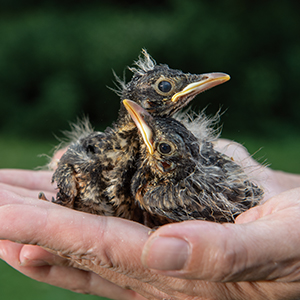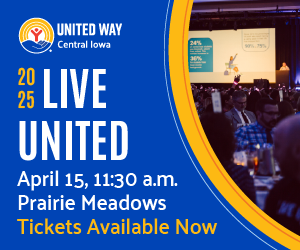From fuzzy fledglings to a full-grown pelican, Iowa Bird Rehabilitation founder Jenni Boonjakuakul takes all kinds under her wing.
Writer: Dan Ray
Photos: Duane Tinkey
In 1999, Jenni Boonjakuakul had one bird: a baby crow named Clover that she raised over the summer while she was in grad school in California. Since then, she’s had more than 11,000.
Now in Beaverdale, Boonjakuakul is the founder and executive director of Iowa Bird Rehabilitation, a nonprofit that rescues, rehabilitates and releases injured and baby birds across Iowa.
She recalled her days with Clover. “I did so many things wrong, and I didn’t know it was illegal. By the end of the summer, I knew I had to turn him over to somebody who knew what they were doing,” she said. She ended up taking the crow to a wildlife center in Sacramento and decided, “If I was going to do something like that again, I better know what I was doing.”
 When Boonjakuakul moved to Iowa in 2007, she started volunteering at the Iowa Wildlife Center and learning about raptors through Saving Our Avian Resources, a nonprofit that rehabs and researches raptors in western Iowa. In 2012, she got her own permit and took in 170 birds. In 2013, she took in 260. And the numbers grew: In 2017, she took in 773.
When Boonjakuakul moved to Iowa in 2007, she started volunteering at the Iowa Wildlife Center and learning about raptors through Saving Our Avian Resources, a nonprofit that rehabs and researches raptors in western Iowa. In 2012, she got her own permit and took in 170 birds. In 2013, she took in 260. And the numbers grew: In 2017, she took in 773.
“I would load up my car with baby birds every day and take them to work. I owned my own business, so I could do that,” she said. “But every hour or so I had to run out to my car and feed everyone and then go back in and work and then run out to the car and feed everyone. It was obviously not ideal.”
At that point, Boonjakuakul was still paying for everything out of her own pocket, and she realized the amount of time and money she was spending was unsustainable for just one person. So she hatched a plan for a nonprofit so she could accept donations and hire volunteers. She founded Iowa Bird Rehabilitation in 2018.
Since 2012, Boonjakuakul has taken in all kinds of birds, from common songbirds like robins and sparrows to hummingbirds, doves, pelicans and geese. IBR accepts any species as long as it was found within Iowa state lines. (They can’t legally accept birds from other states.)
Many of the birds they take in are injured from window strikes, cat and dog bites, and construction projects. Waterfowl and shorebirds alike can get tangled in fishing lines, and songbirds often take bits of the line back to their nests, where it can wrap around their legs and prevent them from flying. Weather poses threats, too.
“Two years ago, a tornado hit in March when an entire flock of white-fronted geese were flying through Iowa,” Boonjakuakul said. “They got caught in the tornado and ended up falling out of the sky, literally. They looked like they’d been hit by a truck.”
These days, IBR has moved out of Boonjakuakul’s car and into her backyard, but it’s quickly running out of space. The nonprofit cared for almost 2,000 birds in 2023 and is on track to double that number in 2024.
Boonjakuakul hopes to find a local facility with an intake center, a nursery and a therapy pool for water birds. She also wants to have an education area to help the public learn how birds affect our ecosystem and how humans can help preserve the North American bird population, which has declined by about 3 billion since 1970.
That has serious consequences. As an example, Boonjakuakul explained that in China in the 1950s, people killed off sparrows because they thought the birds were eating the crops. But soon enough, there was a famine because the crops were destroyed by insects — because there were fewer sparrows to eat them.
“If our bird population continues to decline at the current rate, in another 25 to 50 years humans are going to be directly impacted on a global scale,” Boonjakuakul said.
But she’s still optimistic — and determined to help, one bird at a time, for a long time to come.
“I get to do this for the birds, and I also get to do this for Iowa. … I don’t want to build an organization that retires when I retire. I want to build it to continue on long after I’m gone,” she said. “So I’m really excited to be able to do that. I feel like it’s happening.”
How you can help
If you find an abandoned hatchling or injured bird, time is crucial. Contact Iowa Bird Rehabilitation immediately at 515-207-5008, ibrnest@iowabirdrehab.org or on Instagram @iowabirdrehab.
To learn more about volunteering, donating or getting involved with IBR in other ways, visit iowabirdrehab.org. The group’s annual gala, Wings of Iowa, is set for March 8.











